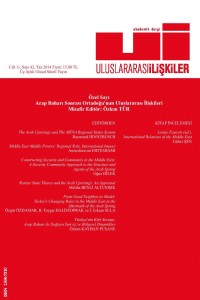Research Article
Year 2014,
Volume: 11 Issue: 42, 93 - 113, 01.09.2014
Abstract
Son dönemde yaşanan Arap ayaklanmaları bölgenin birçok aktörünü Ortadoğu politikalarını
gözden geçirmeye zorlamıştır. Devletlerin dış politikalarının yönetici elitlerin dış politika
rol tasavvurları tarafından şekillendirildiği varsayımına dayanan rol kuramı, aktörlerin
dış politika davranışlarındaki değişimleri açıklamak için uygun bir çerçeve sunmaktadır. Bu
makale, 2010’da başlayan Arap ayaklanmalarının öncesi ve sonrasında, Ortadoğu ve Kuzey
Afrika bölgelerinde kullanılan Türk dış politikası rollerinin analizini yapmaktadır. Bu çalışma
Türkiye’nin Arap ayaklanmaları sonrasında bölgede yumuşak güç üzerine kurulu rollere olan
vurgusunu değiştirip, materyal kapasite gerektiren daha sert rolleri ön plana çıkardığını iddia
etmektedir. Çalışmanın son bölümünde uluslararası politika kuramları üzerinden bu değişimin
ne anlama geldiği tartışılmaktadır.
References
- .........
From Good Neighbor to Model: Turkey’s Changing Roles in the Middle East in the Aftermath of the Arab Spring
Abstract
Middle Eastern politics. Role theory provides a viable tool to explain changes in actors’ foreign
policy behaviors, presuming that states’ foreign policies are shaped by the ruling elites’ foreign
policy role conceptions. This article analyzes Turkish foreign policy roles with regard to the
Middle East and North Africa before and since the Arab uprisings that began in December
2010. We argue that these uprisings caused Turkey to change its emphasis from roles built
on soft power instruments to harder roles requiring material capabilities. We also discuss the
implications of this change with reference to theories of international politics.
References
- .........
There are 1 citations in total.
Details
| Primary Language | English |
|---|---|
| Journal Section | Articles |
| Authors | |
| Publication Date | September 1, 2014 |
| Published in Issue | Year 2014 Volume: 11 Issue: 42 |

